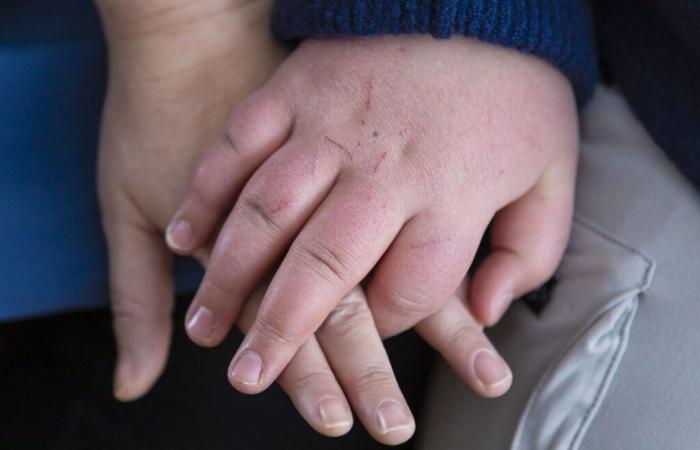
Quebec refuses to include in its public coverage plan a treatment that is necessary to prevent early death for a child from Bellechasse suffering from a rare genetic disease. Despite prayers addressed to the Minister of Health, Christian Dubé, the State still refuses to revise its position under the pretext that the drug is primarily used to fight obesity, an indication that the Régie de l’assurance santé du Québec ( RAMQ) dismisses it straight away.
Xavier Renaud, 12 years old, has never had a normal childhood. The first six months of his life, he spent almost entirely at the CHUL in Quebec, hospitalized for an extremely rare illness: a PCSK1 deficiency, a genetic disorder diagnosed, according to the NORD (National Organization for Rare Disorders, an American organization which is interested in rare diseases), in less than 50 people worldwide.
“Just to give you an idea, it cost us $1,000 for parking the first year,” explains his mother, Isabelle Asselin. The comings and goings between the nine specialist doctors who accompany Xavier continue to punctuate the lives of the boy, his parents and his three older sisters, with around twenty hospital appointments per year.
PCSK1 deficiency causes various hormonal disorders and inhibits, among other things, the neurological function that gives the body the feeling of satiety. Not only does Xavier feel the constant need to eat, but his body stores the calories ingested instead of converting them into energy.
“That means that the food that enters the body is not burned, it is not used,” explains Dr.r Nabil Seidah, director of the Neuroendocrine Biochemistry Research Unit at the Montreal Clinical Research Institute. This also means that this young man does not have insulin and therefore becomes prone to developing diabetes. PCSK1 is also involved in the secretion of growth hormone: if the gene does not fulfill its functions, the person risks being short. »
Xavier experiences all the symptoms of this genetic disorder: he suffers from hyperphagia, significant obesity, severe lethargy and growth disorders since a young age. At 11 years old, his childish body weighed 130 kg. It was impossible for him to move normally: a simple walk was a feat.
Fatigue also compromised Xavier’s education. “They talked to us at one point about sending him to a special class,” explains his father, Jean-François Renaud. Not because he suffers from a deficiency – Xavier is at the top of his class – but because his lack of energy prevented him from keeping up with the others. »
Diabetes was also starting to appear, and Xavier’s liver was rapidly deteriorating. “It was developing into cirrhosis or cancer,” continues his father. This deterioration of the organ led to two outcomes: transplant of a new liver or death.
“A small miracle” at a big price
Xavier’s illness was beyond any hope of remission until last June and the arrival of Imcivree and its medicinal ingredient, setmelanotide, in the boy’s life. Six months of this treatment, approved in 2023 by Health Canada, succeeded in restoring his liver, eliminating his diabetes, restarting his growth and initiating significant weight loss.
“I have a lot more energy than before,” emphasizes Xavier. I have a friend who lives, well, it’s not very far, but I still managed to walk from my house to there. This summer was also the 200e of Sainte-Claire: I was able to sneak out and go to the church to surprise my mother. » A one-kilometer walk that was still unthinkable just six months ago.
“There is no doubt about it,” says Marie-Claude Simard, director of Morissette primary school: “since the fall, Xavier has lost weight, he moves more easily, he is less out of breath and he is a more cheerful little boy. »
“This medicine is a little miracle,” illustrates the boy’s father, Jean-François. “It’s the first time since Xavier’s birth,” adds his mother, Isabelle, “that we have a remedy that only brings positive things. »
The boy’s horizon is finally clearing — but it could become blocked again in three months, because the miracle comes at a high price: nearly half a million dollars per year, which Quebec, due to the rules in in force at RAMQ, does not plan to reimburse.
-Quebec exception
In Canada, Quebec is the only province to immediately exclude the study of treatments against obesity with a view to inclusion in the public coverage plan. However, the National Institute of Excellence in Health and Social Services (INESSS), responsible for evaluating applications for drug registration with the aim of making recommendations to the minister, places Imciivree and setmelanotide in this category. — to the great dismay of world authorities on the subject.
“The message to give to regulatory authorities who are not aware of these rare diseases is that setmelanotide is indicated for genetic obesity,” maintains the Dre Karine Clément, doctor of medicine and director of NutriOmique, a research unit at Sorbonne University and INSERM specializing in the pathophysiology of obesity. It is not just a drug for weight loss, but a drug that acts on eating behavior and the irrepressible biological hunger that these patients feel. We cannot merge it with Ozempic, which has a different mechanism of action. »
INESSS refuses to even study the Imcivree file due to the exclusion policy in force in Quebec. Elsewhere in Canada, however, provinces already reimburse setmelanotide. “Why, in Quebec, don’t we change that? Isabelle asks. Do I have to move so that my son has the right to live? »
A petition tabled in the National Assembly in the fall of 2024 and sponsored by the Liberal Party asked the government to revise Quebec policy to allow the inclusion of treatments against obesity in the public plan. The Coalition Avenir Québec has shown a certain openness and intends to launch a pilot project to evaluate the effectiveness of these drugs.
At the request of the Ministry of Health, INESSS produced a document which recommends the study of four of the five molecules against obesity approved by Health Canada. The only one that INESSS excludes from its recommendations: setmelanotide.
“This medication concerns a small niche of people living with genetically dependent obesity,” specifies INESSS in Dutywhich did not correspond to the context of the planned pilot project and its target clientele. »
The institute nevertheless adds that the Ministry of Health “has every possibility of choosing to include this product or other current or future products in a pilot project”.
Silence of the Minister of Health
The pediatric endocrinologist from the CHUL who has been supporting Xavier for a long time, the Dre Julie Gagné, wrote to the Minister of Health to implore him to include Imcivree in Quebec’s drug insurance plan. “There is an effective treatment for Xavier’s severe illness,” she wrote to the minister on September 16, emphasizing that the generosity of the American pharmaceutical company would end within a few months. “There is therefore an emergency” for Xavier, argued the Dre Won, because without setmelanotide, “his vital prognosis is at stake”.
The Dre Gagné also emphasized that the cost of treatment would not fall on the State since Xavier’s father’s private insurance could cover it. The doctor, however, exposed the absurdity of the situation by emphasizing that “the patient’s insurance company refuses coverage for Imcivree […] given the lack of RAMQ coverage.”
“On behalf of the Minister of Health, Mr. Christian Dubé, we acknowledge receipt of your email,” the cabinet responded the next day. “We assure you that appropriate follow-up will be given to your correspondence. »
Xavier, his doctor and his family have been waiting for 116 days.





